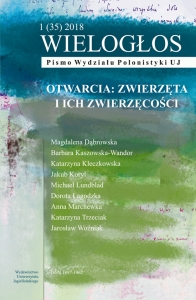Hysteria virilis? Polska historia i histeria Wielkiej Wojny
Hysteria Virilis? Polish History and Hysteria the Great War
Author(s): Wojciech SzymańskiSubject(s): Sociology, Political history
Published by: Wydawnictwo Uniwersytetu Jagiellońskiego
Keywords: hysteria
Summary/Abstract: The article’s aim is critical analysis of the Great War’s cultural memory in Poland and its production’s mechanism that emerged during the war and just after the conflict was over. Masculinist, heroic, brave – always heterosexist – and picturesque vision of the war that dominated, both, official and collective war memory, described by Maria Janion as “the uhlan western”, is a critical point of departure for introduction another version of the Great War memory in Poland. This one, contrary to the official one, is rather antiheroic and traumatic, and might be read as a kind of counternarrative that goes against the official ways of the Great War’s conceptualisations. The article wishes also to discuss the role and mechanism of the “war rumour” that has been identified by Marc Bloch in his study Réflexions d’un historien sur les fausses nouvelles de la guerre by means of applying it to selected life narratives from the Eastern front – in particular memoirs and diaries written by male participants of the Great War. The French historian was particularly interested in how lying affects the psychology of war witnesses, how the witnesses constructed stories about the war events in which they participated or observed, as well as how rumours contribute to the birth of mass psychosis and hysteria. An in-depth scrutiny of several texts written in Polish during the war will also facilitate an identification of another, i.e. gendered, racial, and class aspect of the “false news” which Bloch ignored: namely its role in the creation of male hysteria. One could risk a claim that the relationship between war rumours and male hysteria is a major feature of the war narratives that are to be favoured by this article. The narratives, one should note, which have been erased from the official memory of the Great War and substituted by a heterosexist, masculinist tale about brave and rational soldiers and – here’s another lie – about irrational and hysterical women, civilians, and Jews.
Journal: Wielogłos
- Issue Year: 2018
- Issue No: 37
- Page Range: 57-78
- Page Count: 32
- Language: Polish

